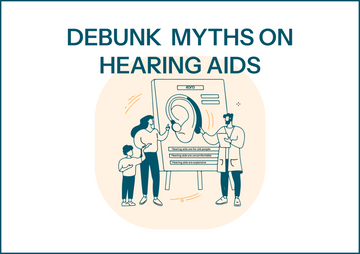Every May, communities around the globe come together to recognize Hearing Awareness Month—a time dedicated to raising awareness about hearing health, the impact of hearing loss, and the importance of early intervention. This month is crucial for educating individuals about their hearing health and the resources available, including OTC hearing aids and professional audiologist services. Join us as we explore why this month matters and how we can better support those affected by hearing loss.
Why Hearing Awareness Month is Important
Hearing Awareness Month serves as a catalyst for discussion surrounding the often-overlooked issue of hearing health. Hearing loss and associated conditions like tinnitus affect millions of people worldwide. According to the World Health Organization, over 1 billion young people are at risk of permanent hearing loss due to unsafe listening practices. By promoting awareness, we can help individuals recognize the signs of hearing loss, seek appropriate treatment, and make informed choices about their hearing health.
Understanding Hearing Loss
Hearing loss can manifest in various forms and affect individuals differently. It may occur gradually with age or result from exposure to loud noises, genetics, or other health conditions. Understanding the different types of hearing loss can help individuals better recognize their symptoms:
- Conductive Hearing Loss: This type occurs when sound cannot efficiently travel through the outer ear canal to the eardrum and the tiny bones of the middle ear. It can often be treated with medication or surgery.
- Sensorineural Hearing Loss: This is the most common type and results from damage to the inner ear or the auditory nerve. It is often permanent and may require the use of hearing aids or other assistive devices.
- Mixed Hearing Loss: As the name suggests, this condition features elements of both conductive and sensorineural hearing loss.
Raising awareness about these types is vital, as early diagnosis and intervention can significantly improve one's quality of life.
Addressing Tinnitus and Its Effects
Tinnitus is a condition that many people with hearing loss experience. It is characterized by perception of sound, such as ringing, buzzing, or hissing, without any external source. For those with hearing loss, tinnitus can be especially debilitating, exacerbating their existing condition.
Understanding the relationship between tinnitus and hearing loss is essential. Many people do not realize that treating hearing loss with an OTC hearing aid can also help alleviate the symptoms of tinnitus. By amplifying external sounds, individuals may find that their perception of tinnitus diminishes. It’s another reason why Hearing Awareness Month is an excellent opportunity for individuals to learn about the various solutions available to them.
The Role of Audiologists
Audiologists are professionals who specialize in diagnosing and treating hearing loss and other auditory disorders. Their expertise is crucial during Hearing Awareness Month, as they help individuals understand their options and the steps they need to take to maintain their hearing health.
Here are some reasons to consider consulting an audiologist:
- Comprehensive Evaluation: Audiologists conduct detailed assessments to determine the extent of hearing loss and recommend appropriate treatments.
- Customized Solutions: They can help individuals find the right type of hearing aids, including OTC hearing aids, tailored to their specific needs.
- Ongoing Support: Audiologists provide continuous care and can recommend rehabilitation programs for those experiencing hearing loss.
Educating Yourself During Hearing Awareness Month
With the abundance of information available, it's easier than ever to educate yourself about hearing health during Hearing Awareness Month. Here are several ways to take action:
- Participate in Local Events: Many communities host gatherings and events to promote hearing health awareness. Engage in these activities to learn more and meet others facing similar challenges.
- Schedule a Hearing Test: If you suspect you may have hearing loss, or simply wish to stay informed about your hearing health, schedule a hearing test with a local audiologist.
- Share Information: Use your platform—be it social media, blogs, or word-of-mouth—to share important information on hearing loss. The more people know, the larger the community we can build around this critical issue.
Top Signs That You Might Need to Get Your Hearing Checked
Recognizing that you might have hearing loss can be difficult. However, being proactive about your hearing health is essential. Here are some signs that you may want to consider consulting a professional:
- Struggling to hear conversations, especially in noisy environments
- Frequently asking people to repeat themselves
- Feeling a ringing or buzzing in your ears (tinnitus)
- Having difficulty following conversations over the phone
- Feeling overwhelmed or fatigued in social situations due to effort required to understand speech
Understanding OTC Hearing Aids
Over-the-Counter (OTC) hearing aids have gained popularity as an accessible option for individuals experiencing mild to moderate hearing loss. They allow users to self-fit their devices without needing a prescription from an audiologist. While OTC hearing aids are a great step towards reducing barriers to hearing health, understanding their limitations is equally important.
Here are some critical points to remember about OTC hearing aids:
- Not a Replacement for Professional Care: While OTC hearing aids can be a suitable choice for some, they do not offer individualized care like professional audiologists can.
- Regulatory Standards: OTC hearing aids must meet specific standards set by the FDA, ensuring that they provide a safe and reliable user experience.
- User Responsibility: Individuals must take on the responsibility for selecting and fitting their devices correctly, which may not be suitable for everyone.
Making Hearing Healthy Choices
Maintaining healthy hearing is a lifelong journey that demands commitment and awareness. There are many small changes you can incorporate into your daily life to protect your hearing:
- Limit exposure to loud sounds—use noise-cancelling headphones or earplugs in noisy environments.
- Reduce the volume when listening to music, especially through headphones.
- Regularly get your hearing checked, even if you believe your hearing is fine.
- Stay informed about the latest developments in hearing health and resources available to you.
Let’s Take Action Together
As Hearing Awareness Month continues, we encourage you to share what you've learned, advocate for your hearing health, and support others in your community. Whether you or someone you know is facing hearing loss or tinnitus, this month is an opportunity for each of us to embrace better communication strategies and preventive measures.
Awareness can lead to change, ultimately improving the quality of life for those living with hearing loss. Let's work together to break the stigma surrounding hearing issues, ensuring that everyone has access to the tools and resources they need. Together, we can foster a community that prioritizes hearing health and recognizes the significance it holds for overall well-being.

























